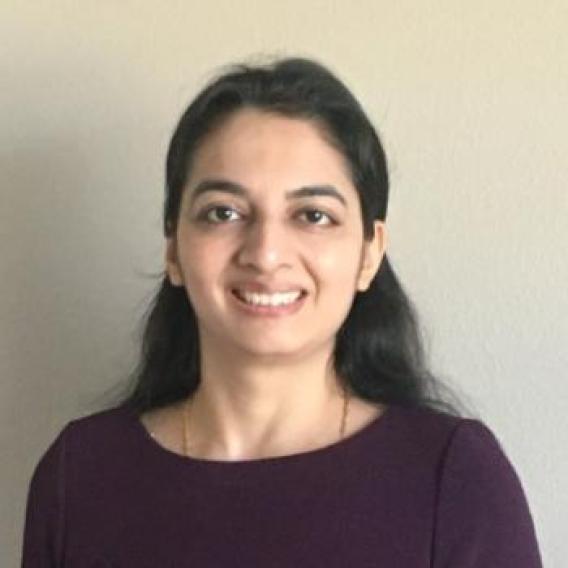Image

Richa Bhatia
Clinical Associate Professor, Psychiatry and Behavioral Sciences
Member, Wu Tsai Neurosciences Institute
Board ReCertification, American Board of Psychiatry and Neurology, Psychiatry (2022)
Board Certification: American Board of Psychiatry and Neurology, Child and Adolescent Psychiatry (2013)
Fellowship: Children's National Child and Adolescent Psychiatry Fellowship (2012) DC
Board Certification: American Board of Psychiatry and Neurology, Psychiatry (2011)
Chief Resident, Saint Louis University School of Medicine (2009)
Residency, Saint Louis University School of Medicine, Psychiatry (2010)
Affiliation:
Dr. Bhatia is a dual Board-certified child, adolescent and adult psychiatrist and a Clinical Associate Professor in the Department of Psychiatry and Behavioral Sciences at Stanford University School of Medicine.
Dr. Bhatia specializes in treating anxiety disorders. Her work has been cited in Time magazine and Scientific American, and her professional opinions have been quoted in media such as CNBC, The Guardian, U.S. News and World Report, The Wall Street Journal, CBS News Bay Area, WUCF-TV (PBS), and others. Dr. Bhatia is a Distinguished Fellow of the American Psychiatric Association. She is an avid advocate of improving mental health awareness and reducing the stigma surrounding psychiatric conditions and treatments. For her work in this arena, she was awarded the 2021 Jerilyn Ross Clinician Advocate Award by the Anxiety and Depression Association of America and the Marian Butterfield award by the Association of Women Psychiatrists. Her other roles include serving as an Associate Editor of Current Psychiatry and as Section Editor for Current Opinion in Psychiatry. Dr. Bhatia is President-Elect of the Association of Women Psychiatrists and Vice president of the Northern California Psychiatric Society. She served as an Acting Medical Director in the department of psychiatry at Dartmouth previously. She is also a Compassion Educator and has received Teacher's Training in Compassion Cultivation Training. She is often invited to give talks at national, regional and local conferences and organizations.
She takes a whole-person biopsychosocial approach, aimed at understanding the biological, psychological, social, cultural and other factors affecting an individual’s mental health. She integrates medication management (where needed) with psychotherapy. Her psychotherapy approach is informed by various evidence-based psychotherapies such as psychodynamic therapy, cognitive behavioral therapy, acceptance and commitment therapy, and mindfulness-based, compassion-focused interventions. Dr. Bhatia’s other professional interests include effects of trauma on mental health, effects of media and technology use in children and adolescents, bullying prevention, compassion and empathy, and ruling out medical conditions mimicking psychiatric disorders.
Dr. Bhatia specializes in treating anxiety disorders. Her work has been cited in Time magazine and Scientific American, and her professional opinions have been quoted in media such as CNBC, The Guardian, U.S. News and World Report, The Wall Street Journal, CBS News Bay Area, WUCF-TV (PBS), and others. Dr. Bhatia is a Distinguished Fellow of the American Psychiatric Association. She is an avid advocate of improving mental health awareness and reducing the stigma surrounding psychiatric conditions and treatments. For her work in this arena, she was awarded the 2021 Jerilyn Ross Clinician Advocate Award by the Anxiety and Depression Association of America and the Marian Butterfield award by the Association of Women Psychiatrists. Her other roles include serving as an Associate Editor of Current Psychiatry and as Section Editor for Current Opinion in Psychiatry. Dr. Bhatia is President-Elect of the Association of Women Psychiatrists and Vice president of the Northern California Psychiatric Society. She served as an Acting Medical Director in the department of psychiatry at Dartmouth previously. She is also a Compassion Educator and has received Teacher's Training in Compassion Cultivation Training. She is often invited to give talks at national, regional and local conferences and organizations.
She takes a whole-person biopsychosocial approach, aimed at understanding the biological, psychological, social, cultural and other factors affecting an individual’s mental health. She integrates medication management (where needed) with psychotherapy. Her psychotherapy approach is informed by various evidence-based psychotherapies such as psychodynamic therapy, cognitive behavioral therapy, acceptance and commitment therapy, and mindfulness-based, compassion-focused interventions. Dr. Bhatia’s other professional interests include effects of trauma on mental health, effects of media and technology use in children and adolescents, bullying prevention, compassion and empathy, and ruling out medical conditions mimicking psychiatric disorders.